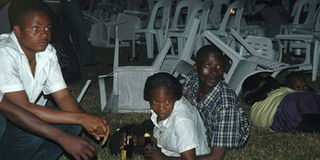Frantic search for relatives after Uganda blasts

Survivors are seen at an Ethiopian-owned restaurant in the Kabalagala area of Kampala late on July 11, 2010 moments after twin bomb blasts tore through crowds of football fans watching the World Cup final, killing 64 people, including an American, and wounding scores others. The country's police chief said the blasts at the restaurant and a rugby club in Kampala late on July 11 were a terrorist attack that may be linked to threats from Al Qaeda-inspired Islamist Shebab rebels in Somalia. AFP PHOTO
KAMPALA, July 12, 2010
Collins Zziwa scrambled around Uganda's main hospital in a blood-stained T-shirt searching for a friend wounded in a deadly blast as they watched the last tense moments of the World Cup final.
"Up to now he is missing," said the 25-year-old Zziwa who was with two friends at Kampala Rugby Club, one of the sites rocked by a bomb explosion that killed 64 people.
"When the blast (occurred), I just fell down and as I was getting up, the second blast went off. When the second blast went off I stayed on the ground for another minute," he told AFP at Kampala's Mulago hostpital on Monday.
When he rose one of his friends was lying on the floor. "She looked dead, you know. So I struggled with her. I lifted her."
The woman was being treated for head injuries, but his other friend whom he declined to name because he had not contacted his family was feared dead.
The walls of the casualty ward were streaked with blood. Dozens of people with serious injuries lay on the hard floor, or on mattresses.
Hospital staff, appearing overwhelmed, moved bodies from the operating room to a nearby chamber, and called relatives from a crowd gathered in the waiting to identify their kin.
In an inner ward in the run-down and ill-equiped hospital, 18-year-old US citizen Chris Sledge was treated for serious wounds on his legs and a bruised eye.
Sledge, a student from Pennsylvania, was watching the Spain-Netherlands match at an Ethiopian restaurant in the southern outskirts of Kampala when the blast ripped through the crowd.
"All I remember is watching the game and I guess I blacked out and I woke up and people were screaming," said Sledge, his legs heavily bandaged.
"And I remember walking around. And then I was like, oh, my foot hurts really bad. I have a few gashes on my foot. Like to the bone."
Loud sobs could be heard in waiting room where relatives gathered to find out about their loved ones.
"She died here," said Sam Kayanya, told AFP of his 26-year-old daughter Damarie.
Kayanya recounted that Damarie, who had just completed her graduate studies in finance, had gone to the Rugby Club with friends to watch the final.
"It was my niece who called to say what happened," he said, his eyes fixed on his telephone, which did not ring.
Fred Opolot, a Ugandan government spokesman, said 71 people had been wounded in the twin blasts which police linked to hardline Shabab rebels in Somalia, where Uganda has deployed peacekeepers.
Early Monday President Yoweri Museveni visited the Rugby Club where most of the deaths occurred.
The African Union condemned the explosions "in the strongest possible terms" while Somalia's President Sharif Sheikh Ahmed accused the Al-Qaeda-inspired Shabab rebels for the a "despicable" and "evil" act.




